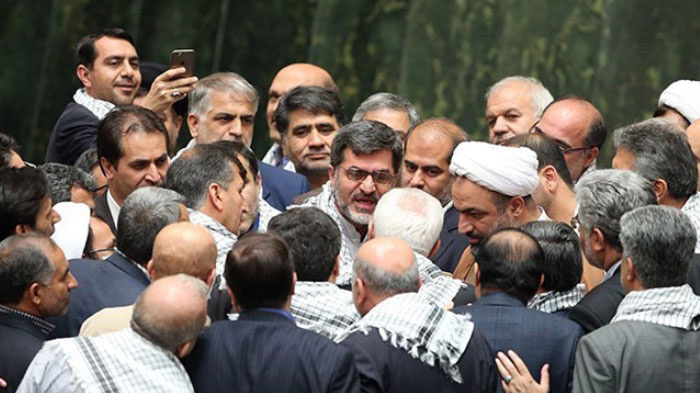Can the Iranian Parliament Obstruct the Deal?

By: Ali Attaran
Among the placards that protestors waved in front of the Iranian Parliament, Majles, on August 16, the most popular one read: “Majles is at the top of affairs”, an oft-quoted sentence of Ayatollah Khomeini. Nonetheless, while the US’ Congress has been fiercely active to block the nuclear deal, the Iranian parliament, despite its significant number of vocal hardline members, seems inable to influence the outcome of the negotiations.
Three days ago, the hardliner newspaper Kayhan criticized the parliament, comparing its decision to go into recess with Congress’ heated debates over the Joint Comprehensive Plan of Action (JCPOA), asking for the rational of Majles’ closure in the middle of a ‘historical turn’. “Closure of the parliament at this critical point, while the US’ Congress is formidably engaged in scrutinizing the JCPOA text causes distress for any caring observer”, Kayhan wrote on Tuesday. On the same day, another group of anti-deal protestors, commonly known as Delvapasan, ‘The Concerned’, gathered in front of the parliament in the historical Baharestan district, calling for the parliament to stop implementation of the deal.
On Thursday, Hassan Sobhaninia, member of the parliament’s National Security and Foreign Policy Committee, told ILNA news agency that the parliament is still seeking the suitable mechanism to probe the Joint Comprehensive Plan of Action. “Foreign Ministry has already made its decision about JCPOA,” Sobhani said, “but this does not mean that other bodies that are legally bound to announce their decision should stay aside.”
Article 77 of the Islamic Republic of Iran’s Constitution reads: “International treaties, protocols, contracts, and agreements must be approved by the Islamic Consultative Assembly.” It is based on this article that some members of the parliament, mostly the critics of the deal, have called for the Majles to have its say on the JCPOA. Government officials have offered their own interpretation of the article nontheless, arguing that Majles’ ratification is unnecessary and unconstitutional. Mohammad-Bagher Nobakht, the cabinet’s spokesperson stated that for the nuclear deal, the National Security Council’s approval would suffice.
Whatever the correct legal interpretation, it is hardly likely that the parliament can influence the direction of the nuclear deal in the way it wants. Since its inception, Iran’s nuclear strategy has been designed not inside the parliament, but among the elite decision-making circles of the Islamic Republic. Precedents exist: the Sixth Parliament (2000-2004) and its Reformist majority passed a motion urging the Reformist president, Mohammad Khatami, to officially join the Additional Protocol, a proposal that Khatami and Rouhani –then Head of the National Security Council- snubbed, insisting on ‘voluntary’ implementation of the protocol. A few months later, the Seventh parliament, boasting a Principlist majority, passed a motion obliging the government to terminate enactment of the protocol, a move that was hailed by the Supreme Leader Ayatollah Khamenei as “the most important decree of the parliament since the[1979] Revolution”. Iran’s new nuclear strategy did not hold dear cooperation with the IAEA.
With the Supreme Leader’s conditional support for the nuclear deal, it seems that little can be done at the moment by the critics in the parliament, but their next chance to influence the nuclear approach may arrive before long, when time comes for actual implementation of the JCPOA and differences between Iran and P5+1 may arise.

